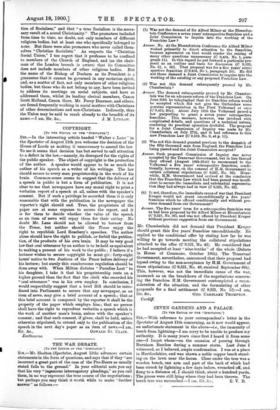COPYRIGHT.
[To THE EDITOR OP THE "SPECTATOR."]
STE,—In the interesting article headed " Walter v. Lane " in the Spectator of August 11th you welcome the decision of the House of Lords as making it unnecessary to amend the law. To me it seems that decision has but served to call attention to a defect in the law,—namely, its disregard for the rights of the public speaker. The object of copyright is the protection of the author. A speaker would appear to be as much the author of his speech as a writer of his writings. The law should secure to every man proprietorship in the work of his brain. Common-sense seems to suggest that the delivery of a speech in public is but a form of publication. It is not clear to me that newspapers have any moral right to print a verbatim report of a speech at all, unless with the speaker's consent. But if such a privilege be accorded them it is only reasonable that with the publication in the newspaper the reporter's right should end. True, the proprietors of the paper are at some expense to secure the report, and it is for them to decide whether the value of the speech as an item of news will repay them for their outlay. No doubt Mr. Lane should not be allowed to borrow from the Times, but neither should the Times enjoy the right to republish Lord Rosebery's speeches. The author alone should have the right to publish, or forbid the publica- tion, of the products of his own brain. It may be very good law that oral utterance by an author is to be held as equivalent to making a present of his work to the public ; I believe if a lecturer wishes to secure copyright he must giv.) forty-eight hours' notice to two Justices of the Peace before delivery of his lecture; but surely this cumbersome regulation should be done away with. When Milton dictates " Paradise Lost " to his daughter, I take it that his proprietorship rests on a higher ground than the fact that the clerk who recorded his " oral utterance" was in his own employ. In conclusion, I would respectfully suggest that a brief Bill should be intro- duced into Parliament to secure that any newspaper, as an item of news, may give a brief account of a speech ; that as this brief account is composed by the reporter it shall be the property of the paper which employs him ; that no person shall have the right to reproduce verbatim a speech which is the work of another man's brain, unless with the speaker's consent; and that such consent, if given, shall be held, unless otherwise stipulated, to extend only to the publication of the speech in the next day's paper as an item of news.—I am,


































 Previous page
Previous page